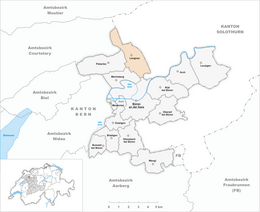Lengnau (Bern)
| Lengnau | ||
|---|---|---|

Lengnau parish hall
|
||
|
||
| Coordinates: 47°11′N 7°22′E / 47.183°N 7.367°ECoordinates: 47°11′N 7°22′E / 47.183°N 7.367°E | ||
| Country | Switzerland | |
| Canton | Bern | |
| District | Biel/Bienne | |
| Area | ||
| • Total | 7.38 km2 (2.85 sq mi) | |
| Elevation | 445 m (1,460 ft) | |
| Population (Dec 2015) | ||
| • Total | 4,956 | |
| • Density | 670/km2 (1,700/sq mi) | |
| Postal code | 2543 | |
| SFOS number | 0387 | |
| Surrounded by | Büren an der Aare, Grenchen (SO), Meinisberg, Pieterlen, Romont | |
| Twin towns | Lengnau, Aargau (Switzerland), Monteroni (Italy), Strakonice (Czech Republic) | |
| Website |
www SFSO statistics |
|
Lengnau is a municipality in the Biel/Bienne administrative district in the canton of Bern in Switzerland.
Lengnau is first mentioned around 983-1002 as Lengenach. In 1228 it was mentioned as Longieuva. The municipality was formerly known by its French name Longeau, however, that name is no longer used.
The oldest traces of humans are late-paleolithic to neolithic flint tools and other objects which were discovered on the Aare river plain. During the Bronze Age, the La Tene era and the Roman era there were settlements in the municipal borders. During the Middle Ages it was part of the Herrschaft of Strassberg, which was acquired by Bern in 1388-93. Lengnau was placed in the bailiwick of Büren. In 1318, during a conflict between Solothurn and Habsburg Austria the village and its church were burned. The church was rebuilt and christened St. Germanus Church in 1323. The church was rebuilt in 1630-40 and renovated in 1959-60.
The Jura water correction projects of the 19th century, drained much of the previously unusable Aare flood plain and opened up extensive agricultural land in Lengnau. During the same time, Lengnau began to develop from a farming village into a watch making town with industries. During the period from 1889 until 1927 about a dozen watch producers and watch part manufacturers opened factories in the growing town. In addition to watchmakers, other industries, such as timber cutters and engineering firms opened in town. During the 19th century clay with a high quartz content was mined in the Lengnauwald. However, in the 1970s the watch industry experienced a crisis and many of the manufacturers closed down. Despite the establishment of new industries in 1983, including; precision machines, electronics companies and décolletage, many workers commute to jobs in other towns. By 2000 over two thirds of those employed worked in neighboring towns, especially Biel/Bienne, Solothurn and Bern. The town has good transportation links. A train station on the Olten-Biel line opened in Lengnau in 1857 and a branch to Moutier was added in 1915. Between 1950 and 1990 many new buildings were finished in town. These include the Catholic parish church over the Lengnau-Pieterlen-Meinisberg parish in 1975 and the nursing home in 1988. Lengnau has three schools and is also home to the secondary school which was founded in 1899.
...
Wikipedia




